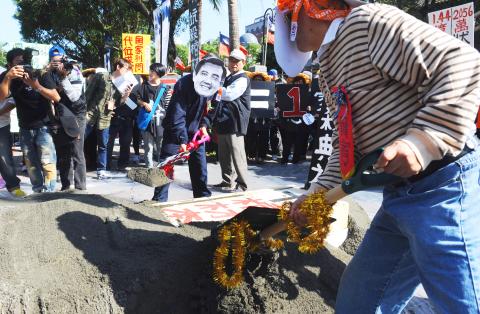Labor activists and laid-off workers staged another protest yesterday against the Council of Labor Affairs’ (CLA) NT$20 million (US$688,000) budget for suing workers over a disputed loan and vowed more intense action if the council does not withdraw the proposal.
Wearing masks of President Ma Ying-jeou (馬英九) and CLA Minister Pan Shih-wei (潘世偉), two activists outside the legislature shoveled sand over a model coffin with the word “life savings” written on it.
The protesters accused the council of trying to take away their life savings by suing them over disputed loans that, in their understanding, were given to them in place of their retirement payouts when their employers absconded 15 to 16 years ago.

Photo: Lo Pei-der, Taipei Times
“Most of these workers had worked at Lienfu Textile Co — and other companies — for decades, but they were not given proper retirement payment when their employers ran away,” Taiwan International Workers Association researcher Wu Yung-yi (吳永毅) said.
“The council intervened, saying it would pay the workers in the form of loans. It promised then that it would not ask the workers to pay them back, but would get their employers to repay the debt,” he said.
However, 15 years later, the council has filed lawsuits against the more than 400 workers who received payments.
Although the council agreed in August to suspend the lawsuits for four months after repeated protests by the workers and Pan promised to come up with to come up with a solution within a year when he took office early last month, no solution has been forthcoming and the council continues to list the lawsuit budget for the next fiscal year.
“Fifteen to 16 years ago, the workers were owed money by their employers, and now they owe money to the government. It doesn’t make any sense,” unionist Lin Tzu-wen (林子文) said.
“If the council is sincere about solving the problem, it should at least withdraw the budget,” he said.
The council has not only sued those who accepted the loan, but also their guarantors and heirs.
One of the protesters, Lee Tzu-feng (李志豐), 64, said he had nothing to do with Lienfu, but he, along with 30 other members of his family, have all been sued by the council.
“My wife was one of Lienfu’s laid-off workers. She accepted the council’s plan at the time, and asked her mother — my mother-in-law — and my father to be her guarantors,” Lee said.
“Since my wife could not afford to pay the loan, 31 people on my side of the family and on my wife’s side of the family are being sued as we all inherited the debts from my father and my mother-in-law,” he said.
Confederation of Taoyuan Trade Unions chairman Mao Chen-fei (毛振飛) urged the council to respond positively to their demand, “otherwise we’re planning to organize more intense protests.”
In addition to the annual autumn rally on Nov. 25, he said the unions also plan to mobilize workers from across the country to protest before the president on Dec. 31 and Jan. 1 during the New Year celebrations.
“We may throw eggs as well as cow droppings during those protests,” he said.
Several lawmakers, including the Democratic Progressive Party’s Tien Chiu-chin (田秋堇), Liu Chien-kuo (劉建國), Tuan Yi-kang (段宜康) and Yang Yao (楊曜), Taiwan Solidarity Union’s Lin Shih-chia (林世嘉) and Chinese Nationalist Party’s (KMT) Huang Chih-hsiung (黃志雄), have voiced their support for the workers and promised to delete the budget once it is raised in the budget review.

Taiwan is stepping up plans to create self-sufficient supply chains for combat drones and increase foreign orders from the US to counter China’s numerical superiority, a defense official said on Saturday. Commenting on condition of anonymity, the official said the nation’s armed forces are in agreement with US Admiral Samuel Paparo’s assessment that Taiwan’s military must be prepared to turn the nation’s waters into a “hellscape” for the Chinese People’s Liberation Army (PLA). Paparo, the commander of the US Indo-Pacific Command, reiterated the concept during a Congressional hearing in Washington on Wednesday. He first coined the term in a security conference last

Prosecutors today declined to say who was questioned regarding alleged forgery on petitions to recall Democratic Progressive Party (DPP) legislators, after Chinese-language media earlier reported that members of the Chinese Nationalist Party (KMT) Youth League were brought in for questioning. The Ministry of Justice Investigation Bureau confirmed that two people had been questioned, but did not disclose any further information about the ongoing investigation. KMT Youth League members Lee Hsiao-liang (李孝亮) and Liu Szu-yin (劉思吟) — who are leading the effort to recall DPP caucus chief executive Rosalia Wu (吳思瑤) and Legislator Wu Pei-yi (吳沛憶) — both posted on Facebook saying: “I

The Ministry of Economic Affairs has fined Taobao NT$1.2 million (US$36,912) for advertisements that exceed its approved business scope, requiring the Chinese e-commerce platform to make corrections in the first half of this year or its license may be revoked. Lawmakers have called for stricter enforcement of Chinese e-commerce platforms and measures to prevent China from laundering its goods through Taiwan in response to US President Donald Trump’s heavy tariffs on China. The Legislative Yuan’s Finance Committee met today to discuss policies to prevent China from dumping goods in Taiwan, inviting government agencies to report. Democratic Progressive Party Legislator Kuo Kuo-wen (郭國文) said

The Ministry of Economic Affairs has fined Taobao NT$1.2 million (US$36,900) for advertisements that exceeded its approved business scope and ordered the Chinese e-commerce platform to make corrections in the first half of this year or its license would be revoked. Lawmakers have called for stricter supervision of Chinese e-commerce platforms and more stringent measures to prevent China from laundering its goods through Taiwan as US President Donald Trump’s administration cracks down on origin laundering. The legislature’s Finance Committee yesterday met to discuss policies to prevent China from dumping goods in Taiwan, inviting government agencies to report on the matter. Democratic Progressive Party